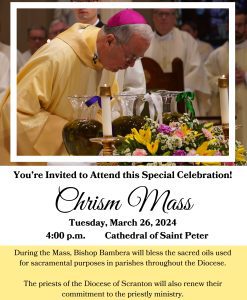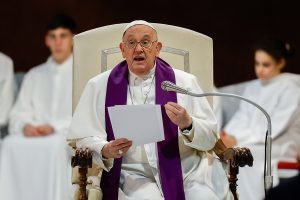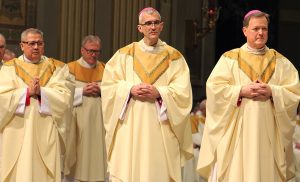(OSV News) – Early morning phone calls aren’t unusual for Father Joseph Friend – a busy pastoral administrator of three parishes in the Diocese of Little Rock, Arkansas – but a recent ring at 7 a.m. left him “100% blown away.”
On the line was Bishop Anthony B. Taylor of Little Rock, who advised Father Friend to get ready to head to Rome at the request of the U.S. Conference of Catholic Bishops.
“I kind of laughed, because I was like, ‘Oh, yeah, Bishop — they want Father Joe to go to Rome,'” Father Friend told OSV News. “And he didn’t laugh back.”
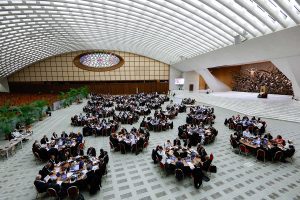
Instead, Bishop Taylor simply said, “I’m not joking.”
As it turned out, Father Friend was among five U.S. priests tapped to share their experiences of parish life with the ongoing Synod of Bishops on synodality.
The group — selected by the USCCB as part of a 300-member worldwide delegation — will also speak with Pope Francis during the April 28-May 2 meeting.
The U.S. priests, who were chosen by synod leaders, had all been involved locally in their synod processes, with some participating as well in the national and continental phases of the synod, Julia McStravog, a theologian and co-coordinator of the North American team for the synod’s continental phase, told OSV News.
A Feb. 3 Vatican statement said the 300 priests will be involved in “roundtables for the sharing of best practices, workshops around pastoral proposals, dialogue with experts and liturgical celebrations.” The results of the meeting will then be incorporated into the working document drafted ahead of the second synod assembly.
The gathering — which will take place at a retreat center in Sacrofano, near Rome — is also an opportunity for parish priests to “experience the dynamism of synodal work at a universal level,” said the statement.
Joining Father Friend will be Byzantine Catholic Father Artur Bubnevych of the Holy Protection of Mary Byzantine Catholic Eparchy of Phoenix; Father Don Planty of the Diocese of Arlington, Virginia; Father Luis Navarro of the Diocese of Stockton, California; and Father Bill Swichtenberg of the Diocese of Green Bay, Wisconsin.
Father Bubnevych told OSV News that his first reaction to the news was “shock” and a deep sense of being “unworthy.”
“I was shaking,” he admitted.
Both he and Father Friend each said they feel a sense of responsibility to represent those to whom they minister.
“I (feel) a call to be responsible to bring our unique experience of the Byzantine Ukrainian Catholic Church here in the U.S. (to the synod),” said Father Bubnevych. “The Byzantine Catholic Church … (has been) kind of marginalized, and even nowadays, (I find) in my priestly ministry the Roman Church is often lacking knowledge about our presence and our work among the faithful.”
He said Catholics of Byzantine-rite churches enrich the universal church through their Divine Liturgy, which he described as “a very powerful point of unity, growth and thriving.”
The strictness of the Byzantine Church’s fasts are “challenging to the modern world,” as are the Byzantine expressions of humility through prostrations during the liturgy and observances such as Forgiveness Sunday, during which “people to come out and extend forgiveness in front of the community, to the priest and to each other,” said Father Bubnevych.
As pastor of Our Lady of Perpetual Help Byzantine Catholic Church in Albuquerque, New Mexico, he also wants to highlight the charism of his “small parish community” at the global synod’s priest gathering.
“It’s like a family environment where everyone knows everyone,” he said. “(It’s) a kind of a model of this small primitive church that I think existed at the very beginning (of Christianity), where people were very bonded, welcoming and just united in Christ, listening to the Holy Spirit.”
Father Friend said his parishioners — many of whom are immigrants — now feel that “Rome has seen us” by virtue of his selection.
“I wish you could see their faces,” he said. “They’re like, ‘Rome is going to hear of Hamburg, Crossett, Lake Village in Arkansas.’ (The) people feel seen and they feel meaning.”
Father Friend — whose uncle is a monsignor and whose brother also is a priest — said he hopes to represent fellow hardworking clergy who remain steadfast in their mission, particularly in challenged areas.
“We’ve got a lot of guys who just have their heads down — kind of dogs in the field — who love the church and what it is, and love our people,” Father Friend said. “I think that there are a ton of priests out there that are radically in love with Jesus, that love the church, that love the structure of the church, that love the pope (and) the sacraments, and also radically love our people.”
Father Bubnevych said he plans to “be led by the Spirit” during his time in Rome.
“I’m praying to the Holy Spirit in order to be able to really listen to what the other brings,” he said. “So (I have) no (particular) expectations, but a great expectation from the power of the Holy Spirit to guide me.”

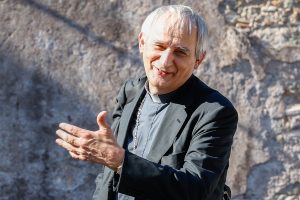

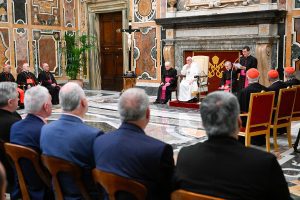
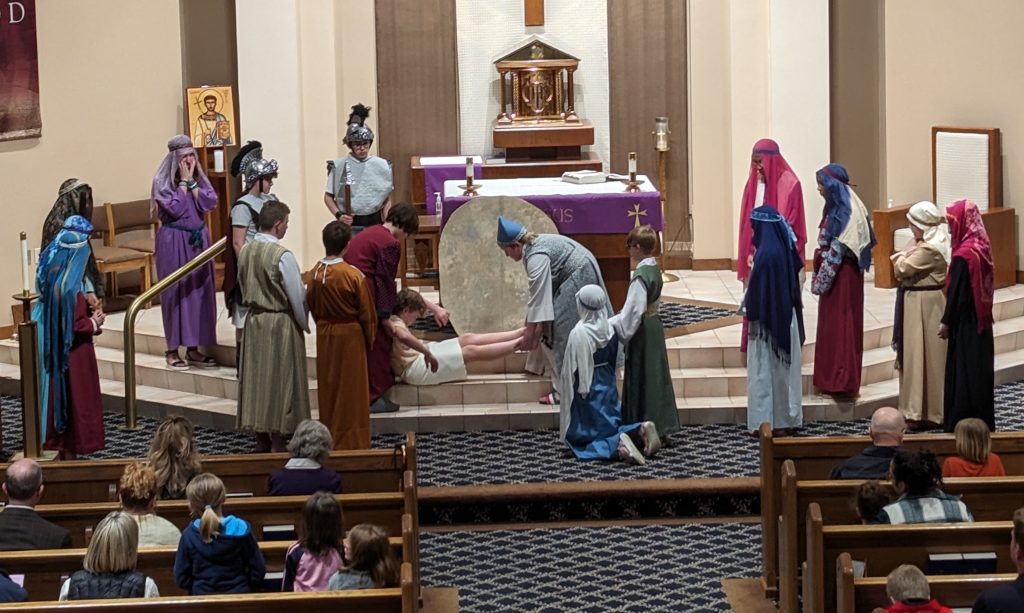 On Friday, March 15th at 7:00 PM, 6th & 7th grade students from the St Boniface & St Lawrence PREP program, presented a Living Stations of the Cross at St Lawrence Church in South Williamsport. They brought the Stations to life through costumed visual representations, music and meditations. The Stations were well attended by families and other parishioners.
On Friday, March 15th at 7:00 PM, 6th & 7th grade students from the St Boniface & St Lawrence PREP program, presented a Living Stations of the Cross at St Lawrence Church in South Williamsport. They brought the Stations to life through costumed visual representations, music and meditations. The Stations were well attended by families and other parishioners. 
